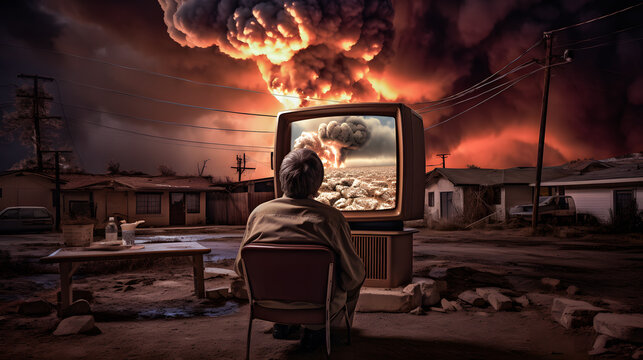In Uganda, the proliferation of television channels has unleashed a Pandora’s box of horrors upon the nation, ushering in an era of moral decay and societal collapse. Once a beacon of wholesome entertainment and enlightenment, television has devolved into a cesspool of depravity, corrupting the hearts and minds of Uganda’s youth with its toxic offerings. As we mourn the lost innocence of a generation, let us expose the harrowing truth of TV addiction and its devastating consequences.
Gone are the days when Ugandans could gather around the family television, basking in the warmth of wholesome programming. In the heart of Kampala, the number of cable television companies has multiplied, flooding the airwaves with a deluge of filth and degradation. Where once there was only UTV, a bastion of virtue and wisdom, now stands a labyrinth of channels peddling violence, sex, and moral turpitude. The innocence of youth is sacrificed on the altar of profit, as the purveyors of televised poison line their pockets with the souls of the impressionable.
In our youth, we were content with the simple pleasures of UTV, where tales of morality and virtue filled the airwaves. But today, the story is vastly different. Rape, murder, and nudity are no longer the stuff of nightmares but the fodder of prime-time entertainment. Pornography and drug abuse are glorified as acceptable behaviors, while revenge and alcoholism are celebrated as symbols of status and power. The moral compass of a nation has been shattered, its guiding light obscured by the relentless onslaught of televised depravity.
The impact of this moral decay is felt most keenly by Uganda’s children, the innocent victims of a media machine run amok. No longer shielded from the horrors of the world, they are bombarded with images of violence and promiscuity from an early age. Their tender minds, once fertile soil for growth and learning, are now poisoned by the toxic seeds of televised filth. As they grow, so too does their desensitization to human suffering, their empathy eroded by the constant barrage of graphic imagery.
But the consequences of TV addiction extend far beyond the realm of morality, reaching deep into the fabric of Ugandan society. Violence and crime, once confined to the shadows, now stalk the streets with impunity, fueled by a culture of aggression and lawlessness perpetuated by the small screen. Families, torn apart by the corrosive influence of television, find themselves adrift in a sea of dysfunction and despair, their bonds of love and kinship sundered by the divisive forces of televised vice.
As we bear witness to the slow death of our nation’s soul, the imperative to break free from the shackles of TV addiction becomes clear. We must rise up, united in our determination to reclaim our moral compass and restore dignity to our beloved Uganda. Public outcry must be heard, demanding stricter regulations on television content and greater accountability from those who profit from our collective suffering. Only then can we hope to build a brighter future for generations to come, where innocence is cherished and virtue reigns supreme.
But let us not despair, for even in the darkest of times, there is still hope. Together, we can stem the tide of moral decay and usher in a new era of enlightenment and righteousness. Let us stand firm against the onslaught of televised depravity, resolute in our commitment to safeguard the innocence of Uganda’s children and preserve the sanctity of our nation’s soul. The time for mourning is over; the time for action is now.







Discussion about this post